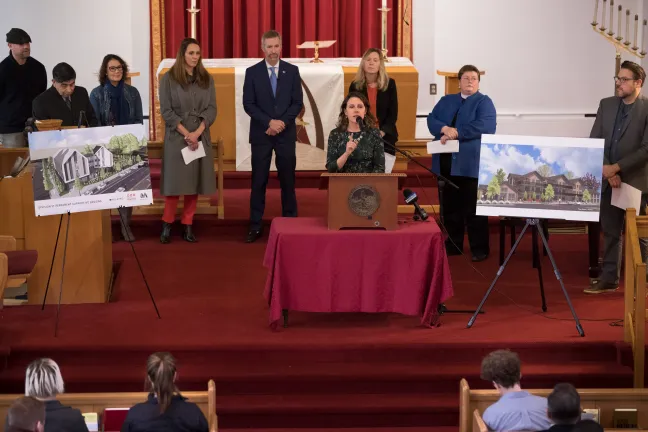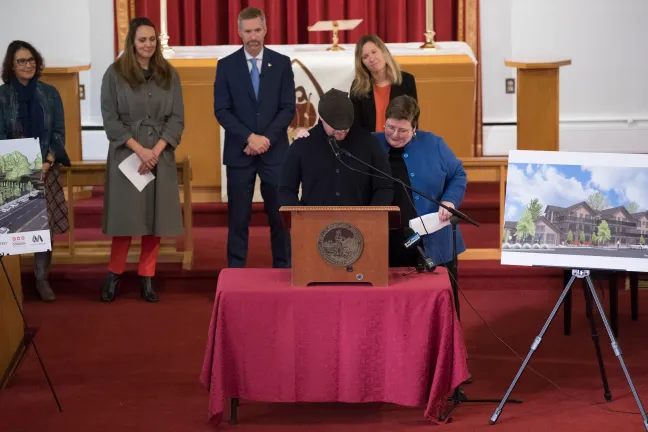PORTLAND — As they work to address chronic homelessness, Multnomah County, the City of Portland, and the State of Oregon on Thursday announced $12 million in shared funding for two developments to increase the region’s supply of permanent supportive housing.
Supportive housing is often the most effective answer for chronic homelessness and the visible livability challenges that long-term homelessness presents. It combines accessible, deeply affordable housing with the supportive services — including mental health and addiction services — that some people need to stay in their homes.
Combined, the two funding awards will create 98 affordable, single-room-occupancy units — with 78 of those units designated for supportive housing. The developments also build on partnerships with the private sector and faith community.
“When you’re on the street day after day, it’s a struggle to even stand a fighting chance. This is why long-term supportive housing is the solution to long-term homelessness,” Chair Deborah Kafoury said during a news conference at St. Mark’s Lutheran Church, a partner in one of the developments. “It gives people with the highest needs a stable home; a place where they have the privacy that we all deserve.”
Findley Commons, proposed by Do Good Multnomah and HomeFirst Development, will be built on nearly half of the large parking lot at St. Mark’s. It will create 38 units of housing for veterans.
In this model, single-room occupancy units would help stabilize the veterans, who would then transition into larger units. In addition, Findley Commons will serve as pilot for a new subsidy model combining unsubsidized units and Veterans Affairs Supportive Housing (VASH) vouchers.
The Division Street Apartments, proposed by Central City Concern and Related Northwest, will provide 40 supportive housing single-room occupancy units and 20 studios. Many of the units will be reserved for extremely low-income people experiencing mental illness, including severe mental illness. Central City Concern will be the service provider.
The Joint Office of Homeless Services, Multnomah County Mental Health & Addiction Services, the Portland Housing Bureau and Oregon Housing and Community Services first announced the funding opportunity that led to the projects in July.
The announcement called for cost-effective proposals to create supportive housing for people experiencing mental illness, with a focus on updating the single-room-occupancy model. The funding opportunity marked the first time capital funding for affordable housing was directly bundled with funding for the services vulnerable residents need to thrive in that housing.
“This innovative pilot is the first of its kind—leveraging state, county and city partnerships in a targeted effort to better use our dollars to address chronic homelessness, with an emphasis on providing crucial mental health services” Mayor Ted Wheeler said. “Homelessness is a national humanitarian crisis. It will take more than cities — but regional, statewide and federal partnerships to solve it.”
Multnomah County’s Board of Commissioners and the Portland City Council first voted in 2017 to pursue creating roughly 200 new supportive housing units each year through 2028. They reaffirmed that goal in September 2018, when housing and homelessness officials announced more than 500 of those promised units were already in place or in development.
“The benefits of permanent supportive housing are well-documented. This is a proven strategy we will implement statewide,” said Margaret Salazar, Director of Oregon Housing and Community Services. “Oregon Housing and Community Services is thrilled to contribute $2 million to the City of Portland and Multnomah County’s efforts to increase supportive housing and address homelessness and housing instability for Oregon’s most vulnerable community members.”


